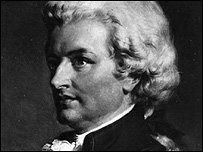
Scientists argued over whether the phenomenon had a relatively simple explanation, such as just improving a person's mood, or if the effect was tied to a unique quality of the Mozart's compositions. One study reported that the particular rhythmic qualities of Mozart's music mimic some rhythmic cycles occurring in human brains.
Now Rauscher and her collaborator Hong Hua Li, a geneticist at Stanford University in California, think they have found the molecular basis of the Mozart effect. Their study used rats, which, like humans, perform better on learning and memory tests after listening to the sonata.
The researchers found that these smarter rats had increased gene expression of BDNF, a neural growth factor, CREB, a learning and memory compound, and synapsin I, a synaptic growth protein, in their hippocampus, as compared to control rats who had listened to equivalent amounts of white noise.

No comments:
Post a Comment